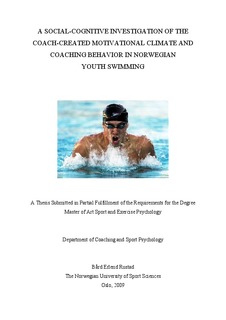| dc.description.abstract | Previous research findings have indicated that coaches play an important role in the construction of the motivational climate (Ames, 1992b; Roberts, 1993; Brustad, Babkes & Smith, 2001; Treasure, 2001; Smith, Fry, Ethington & Li, 2005; Smith & Smoll, 2007; Smith, Smoll & Cumming, 2007). Therefore, the main purpose of this study was to examine how athletes perceived their coaches’ behavior and the corresponding motivational climate, and how these influenced a range of well-being parameters (e.g., athlete burnout, subjective vitality, as well as positive and negative affect). A total of 202 male and female Norwegian swimmers (ages 14-24) completed a battery of questionnaires (e.g., Motivational Climate Scale for Youth Sports, CBAS-PBS, Athlete Burnout Questionnaire, Subjective Vitality Scale, and the PANAS). Bivariate correlational analyses and a canonical correlation analysis were used to examine relationships between the variables. Consistent with earlier findings, athletes who perceived coaching behaviors that emphasized positive reinforcement, mistake-contingent encouragement, corrective instruction given in a positive and encouraging fashion, and proper technical instruction perceived a mastery climate (Smith et al., 2005; Smoll & Smith, 2006; Smith & Smoll, 2007; Duda & Balaguer, 2007). In contrast, coaching behaviors that emphasized punitive technical instruction were positively correlated with an ego climate. However, perception of a mastery climate was also positively correlated with coaching behaviors that emphasized non-reinforcement, punishment, and ignoring mistakes. Further, our findings indicated that there was a positive correlation between an ego climate and the three dimensions of burnout, as well as total burnout. We also found a positive correlation between a mastery climate, subjective vitality, and positive affect. | en |
